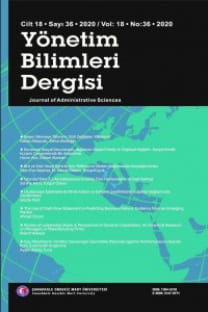Bilgi Yönetişimi ve Üniversite Ekonomisi: Teorik Bir Yaklaşım
Bilgi yönetişimi yaklaşımı bilginin üretim ve yayılma seviyesini artırmayı hedefleyen sistemleri açıklamakta kullanılan bir kavramdır. Bu yaklaşımdaki temel kurumsal yapı üniversitedir. Uzun ömürlü ve dinamik kurumlar olan üniversiteler hem bilimsel hem ekonomik hem de sosyal yaşam için büyük önem taşıyan kurumlardır. Üniversitelerin ekonomik rollerini iki ana başlık altında toplamak mümkündür; klasik roller ve karmaşık roller. Klasik roller en geniş anlamıyla, somut üretim faktörleri gibi klasik ekonomik yaklaşımın araçları ile açıklanabilen roller olarak tanımlanabilir. Karmaşık roller ise bilgi ekonomisi yaklaşımının araçları olmadan açıklanamayan rollerdir. Günümüzde gelişmiş ülkelerde üniversitelerin karmaşık rollerine verilen önem klasik rollerine verilenden görece daha fazladır. Yüksek seviyede yenilik yaratma ve yaratılan yeniliklere adaptasyon sürecini kısaltma bağlamında üniversiteler hem bilgi tabanlı ekonomiler için hem de bilgi toplumu için olmazsa olmaz kurumsal yapılardır
Anahtar Kelimeler:
Bilgi Yönetişimi, Ulusal-Bölgesel Yenilik Sistem
Knowledge Governance and Economıcs of University: A Theorical Approach
-
Keywords:
-,
___
- ANTONELLI, Cristiano.; “The Governance of Technological Knowledge: Strategi- es, Processes and Public Policies”, 2003, [http://ideas.repec.org/p/uto/labe- co/200306.html], Erişim: (02/04/2007).
- ANTONELLI, Cristiano.; “Models of Knowledge and Systems of Governance”, Jo- urnal of Institutional Economics, 1: 51-73, 2005.
- ANTONELLI, Cristiano.; “The Economics of University: A Knowledge Governan- ce Approach”, Department of Economics ‘S. Cognetti de Martis’ Working Paper Series, 02/2006, 1 – 20, 2006.
- ANTONELLI, Cristiano.; Localized Technological Change: Towards the Economics of Complexity, Routledge, London, 2008.
- ARROW, Kenneth. J.; “Economic welfare and the allocation of resources for inven- tion”, in Nelson, R. R. (ed.) The Rate and Direction of Inventive Activity: Economic and Social Factors, Princeton University Press for N.B.E.R., Princeton, 609-625. 1962.
- COATES, David. ve WARWICK, Ken.; “The Knowledge Driven Economy: Analy- sis and Background”, The Economics of the Knowledge Driven Economy Conferen- ce, London, 1 – 10, 1999.
- DAVID, Paul. A. ve FORAY, Dominique.; “Economic Fundamentals of Knowledge Society”, Policy Futures in Education, 1 – 19, 2002.
- ETZKOWITZ, Henry.; “The Triple Helix of University – Industry – Government: Implications for Policy and Evaluation”, Swedish Institute for Studies in Educati- on and Research Working Paper Series, 11/2002.
- FAGERBERG, Jan.; “Innovation: A Guide to the Literature”, Centre for Technology, Innovation and Culture, University of Oslo, 2 – 13, 2003.
- JOHNSON, Björn., EDQUIST, Charles. ve LUNDVALL, Bengt-Ake.; “Economic Development and National System of Innovation Approach”, First Globelics Conference, November 3-6, Rio de Janeiro, 2003.
- LUNDVALL, Bengt-Ake.; Innovation, Growth and Social Cohesion: the Danish Model, Edward Elgar Publishing,UK, 1 – 40, 2002.
- LUNDVALL, Bengt-Ake.; “From the Economics of Knowledge to the Learning Economy”, 1 – 15, 2003.[http://www.globelicsacademy.net/2007/papers/ From the Economics of Knowledge to the Learning Economy.pdf], Erişim: (08/08/2008).
- OECD; The Knowledge –Based Economy, OECD Press, Paris: 7 – 43, 1996.
- OECD; “Understanding the Regional Contribution of Higher Education Instituti- ons: A Literature Review”, OECD Education Working Paper Series, No. 9, OECD Press, France: 7 – 60, 2007.
- REICHERT, Sybille.; “The Rise of Knowledge Regions: Emerging Opportunities and Challenges for Universities”, European University Association Publications, Brussels, 6 – 44, 2006.
- ROMER, Paul. M.; “The Origins of Endogenous Growth”, The Journal of Economic Perspectives, 8/1: 3-22, 1994.
- RUTTAN, Vernon. W.; Technology, Growth and Development, Oxford University Press, New York, 2001.
- STIGLITZ, Joseph. E.; “Knowledge in the Modern Economy”, The Economics of the Knowledge Driven Economy Conference, London: 37 – 57, 1999.
- ISSN: 1304-5318
- Başlangıç: 2003
- Yayıncı: Yönetim Bilimleri Dergisi
Sayıdaki Diğer Makaleler
Bilgi Yönetişimi ve Üniversite Ekonomisi: Teorik Bir Yaklaşım
Küreselleşme Sürecinde Ticari ve Finansal Açıklığın Ekonomik Büyüme Üzerine Etkisi: Türkiye Örneği
Jeotermal Enerjinin Ekonomik Katkıları ve Çevresel Etkileri: Denizli-Kızıldere Jeotermal Örneği
Göç ve Turizm: Türkiye-Almanya Örneği
İnsan Kaynaklarının Geliştirilmesinde Farklı Bir Yaklaşım Olarak Kurum Üniversiteleri
